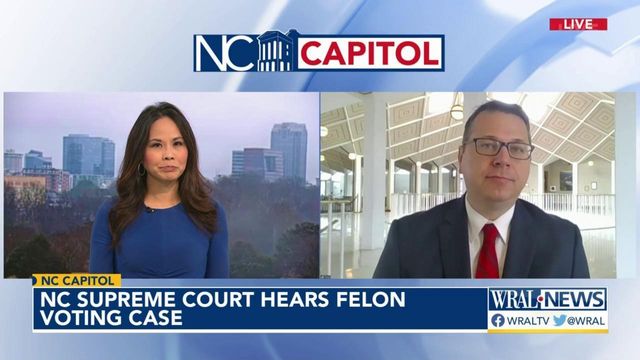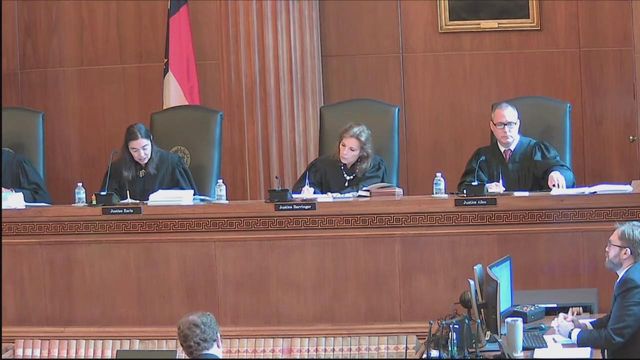When can ex-felons vote in NC? High court hears arguments in voting rights case
The state Supreme Court heard arguments in the first political lawsuit before the high court since Republicans flipped control in the 2022 elections.
Posted — UpdatedEx-felons are allowed to vote in the state only after they finish probation and parole and pay off court fees. Activists say voting rights should be restored as soon as someone finishes their prison sentence, and that North Carolina law discriminates against Black people, who are more likely to have a felony conviction, and against people without enough money to pay fines.
That argument won out ahead of last year’s general elections, and people on probation were allowed to vote. Now the Supreme Court of North Carolina is mulling a decision that will determine whether that practice continues. Results of the November court elections made it more likely that North Carolina’s law survives and people on probation are disenfranchised again.
During Thursday’s oral arguments, conservative judges questioned key elements of the activists’ case.
Chief Justice Paul Newby jousted with Daryl Atkinson, co-director and attorney for Forward Justice, over the meaning of “property qualifications,” pushing back against Atkinson’s argument that requiring people to pay fines before they vote is akin to a long-unconstitutional rule requiring property ownership to vote.
Justice Trey Allen, another Republican on the court, noted that the North Carolina Constitution says anyone convicted of a felony loses the right to vote, unless that right is restored by in a manner “prescribed by law.” The constitution’s default is "no felon can vote” unless the legislature allows it, Allen said, and there is no law on the books that says they can vote again “simply upon being released from incarceration.”
Allen said the lower court in this case, by allowing people to vote earlier, seemed to have imposed a remedy beyond its authority.
Democratic Justice Anita Earls, who was a civil rights attorney before she joined the court, pressed Peter Patterson, an attorney for Republican lawmakers defending state law, on his case. Patterson argued there is no evidence of racist intent behind the law because it treats people of different races the same, and that allowing people to vote after they’ve finished probation and paid fines is “perhaps the most natural place to draw the line.”
Patterson also noted that the law increased voting rights when it passed in the 1970’s by relaxing older felon disenfranchisement rules. He said something is wrong if “a signature achievement of the civil rights movement” can be invalidated by accusations of racism.
Republican Justice Phil Berger Jr., whose father is a key GOP legislative leader and a defendant in the case, asked for proof of racial animus. Stanton Jones, who along with Atkinson represents plaintiffs in the lawsuit, said he could no more prove racism for this law than he could for a poll tax or a literacy test — both hurdles to voting thrown out by the courts as unconstitutional and racist decades ago.
North Carolina’s felon enfranchisement law was designed to appear “race neutral,” Jones said, but in reality it impacts potential Black voters more than white ones.
Atkinson argued that it also treats poor people different than rich ones.
“You cannot vote if you do not pay money,” he said.
Justice Richard Dietz, who along with Allen is one of two new Republican justices elected to the court in November, questioned whether the court could even change state law as Jones and Atkinson have asked. Wouldn’t the remedy, if the law is unconstitutional, be to simply strike it down? Dietz asked. And if that’s done, won’t that make the state’s rules tougher, since the constitution contemplates ex-felons not voting at all unless there’s a law in place allowing it? Dietz asked.
Jones said that would disenfranchise potentially hundreds of thousands of people and go against the past 50 years of lawmaking in the state. He asked the court not to strike down North Carolina’s law in full, but to strike some of it to make it constitutional.
Arguments lasted about an hour before a full courtroom. There was so much interest in the case from advocates seeking a looser re-enfranchisement law that First Baptist Church, across Wilmington Street from the Supreme Court building in downtown Raleigh, hosted more than 50 people to watch a livestream of arguments.
The high court has not said when it will rule in the case, which is titled Community Success Initiative v. Moore and is named after one of the groups that brought suit and Speaker of the House Tim Moore.
• Credits
Copyright 2024 by Capitol Broadcasting Company. All rights reserved. This material may not be published, broadcast, rewritten or redistributed.






